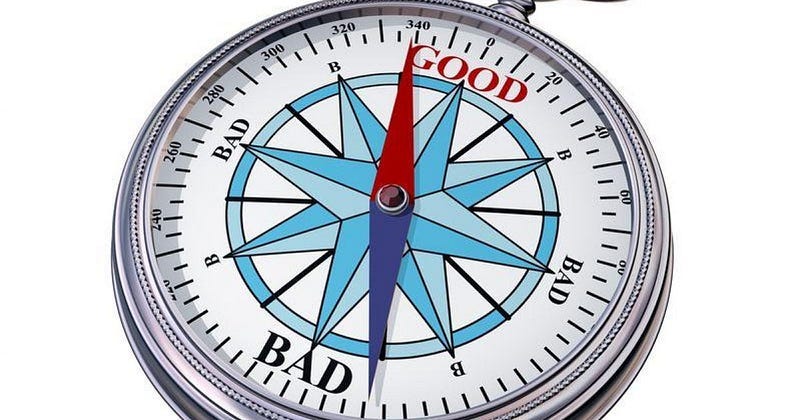Karma
Whenever something happens I didn’t want or foresee, I still feel an initial burst of anger.
How dare Fate, Karma, God, (insert anyone other than me) make this awful thing happen?
Am I a victim?
After giggling at my foolishness momentarily, a nanosecond later, I cut that bullshit off by reminding myself that whatever occurs, it happens because of actions I took in the past, even if it was lifetimes ago.
Reincarnation is Useful Bullshit
Do I actually believe, as ontological Body reality, that I have actually existed through endless lifetimes?
No. I don’t.
But I don’t need to.
I don’t need to believe in magnetism to use a compass.
Karma still works when I act as if I’ve lived an infinite number of lifetimes, and more importantly, I have a great many more lives yet to go.
When something bad happens to me that doesn’t appear to be in any way connected to anything I’ve ever done in my life, my first reaction is, “Why me God?”
That question opens a doorway to suffering.
Enter Karma.
Instead, if I accept that whatever happened was due to something I did wrong in a previous life, it has two positive effects.
First, it cuts off the “why me” victim nonsense that makes me feel like shit.
Second, it makes me even more confident that my actions have consequences, which is what I want.
Third, and most importantly, when I consider my future lives, I know that anything I do will come back on me at some point, even if it takes thousands of lifetimes.
There is no escape from responsibility.

Moral Compass
People hurt each other for selfish reasons because they believe they can get away with it.
If my actions have no consequences, I would pretty much do what I want.
Most religions and cultures invent a Hell as a catch-all insurance policy against getting-away-with-it while you are alive, hoping perhaps this will motivate a few people to “be good” to avoid eternal damnation.
As a concept, it’s become so burdened by legalese, pointless debates on dogma, and philosophical mental masturbation that it no longer has enough emotional impact to scare people straight, assuming it ever did.
Karma is the shackle of personal responsibility every ego wants to avoid.
Yet, it must be chosen.
People have been imposing their Gods on each other since antiquity, forcing them to see the Light by using Dark, usually extinguishing the flames of heathens and heretics if they refused to accept someone else’s Salvation.
It was never about them, the people supposedly being Saved.
How fucked up is that?
Buddhism is different: It’s a path of choice.
You either choose to feel Karma’s navigating field or you don’t.
Here’s how it works.
If I truly believed my actions were absolutely going to come back to me in some form or fashion, and there was no escape, none, no dodging responsibility — when I felt that hit my heart — I didn’t want to inflict my selfish desires on anyone.
The Power of Karma is its ability to prevent me from hurting others.
I use it as a mind hack.
A useful tool to drive my motivation toward virtue.
When you learn to navigate by it Karma is an excellent moral compass, a needle aligning your heart True North, pointing you down the Proper Path.
(Taylor Swift, Your words are beautiful. Your every action proves your authenticity. You obviously “Get It.” I feel your heart!
Swifties, Disciples of Taylor Swift, you sit at the feet of a Master. You are in good hands.)
100% Responsible
Once I started navigating by Karma, I took 100% responsibility for everything that occurred to me.
Why? Because if I act unwisely, hurt people, or do bad things, it’s all going to come back to bite me in the ass.
I don’t want that.
There is no pleading for mercy. Directing consequence to another. Offering rationalizations and hoping the verdict goes my way.
Potential outcomes down the dark path are unpredictable and undesirable.
Perhaps a rival takes revenge. Perhaps a fraud perpetrated years ago is uncovered. Secrets haunt you at night, disturbing your mind.
Emotionally, you’re always waiting for the other shoe to drop.
I don’t want that.

Regret: What Responsibility Feels Like
Live-with-no-regrets is the anthem of Desire. It’s not wise spiritual advice.
A life without regrets represents a failure to learn from mistakes.
For many years, I would seduce my wife, subtly coercing her into pleasing me when she really didn’t want to.
It isn’t a virtuous behavior. I put my selfish desire over her needs and wants.
I would not have been happy if the roles had been reversed.
For many years, I continually inflicted subtle emotional pain on my life partner.
I didn’t feel that pain because I didn’t consider her experience, and I likely would have convinced myself I wasn’t responsible for her reaction.
I felt no regret.
When I looked honestly at the behavior, an unpleasant feeling of revulsion arose.
The deeper I dug, the more intense I felt that pain.
Most people recoil when they feel the unpleasant feelings of remorse.
I use it as a warning sign.
It’s telling me that I am considering a behavior that has caused others pain in the past.
If I continue down this path, I am likely to do something that will make me feel that pain with more intensity.
Don’t do it.
Just say no.
